by Ivary & Paola | Feb 15, 2019 | In The Loop
La Lectura
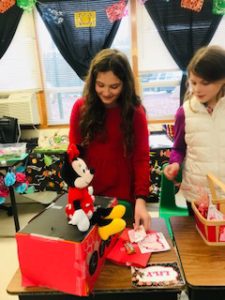
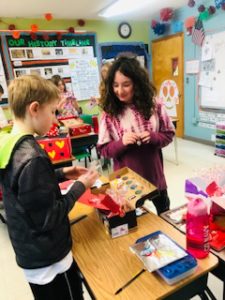

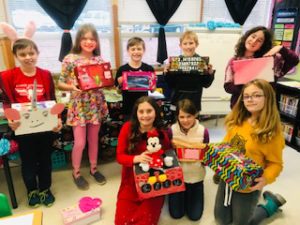
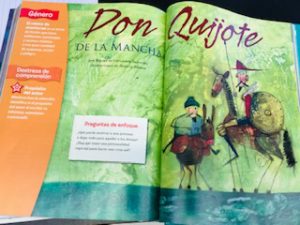
This week we started working on a very special project. This will be absolutely EPIC!.
What a sweet week!
This week we continued to work on our literacy routines such as word work, grammar and spelling. The highlight of our week, however, was celebrating Valentines Day! It was such a beautiful celebration of friendship and love. We worked on an expository writing Valentines day project and did some Valentines day art. We also had a chance to review some argumentative speaking/writing guidelines. All in all, we had so much fun!
Ciencias
- Explain how adaptations help organisms survive in an environment.
- Describe how population can change over time in response to environmental factors.
Mathematics
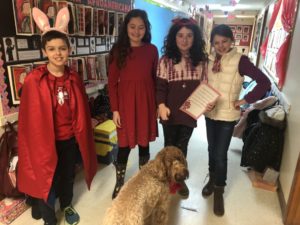
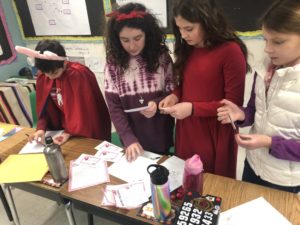
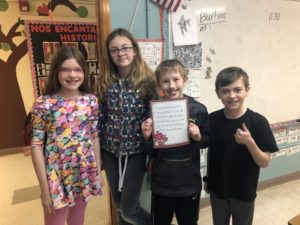
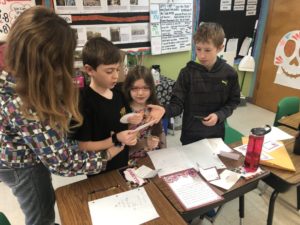 This week we started the unit Equations and Inequalities
This week we started the unit Equations and Inequalities
- We learned the substation method where you plug in a number to the equation to see if it is the right number.
- Then we learned the balancing method where you balance out the equation so the variable is alone so you can find out the value of the variable.
- Last but not least on Valentine’s Day we did an escape room were we had to get rid of the love bugs by solving algebraic expressions, using the secret decoder, and finding envelopes, this week math was a blast!
(Written by:Jack Parbon )
History & Geography
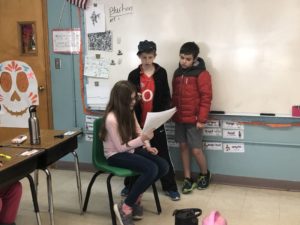

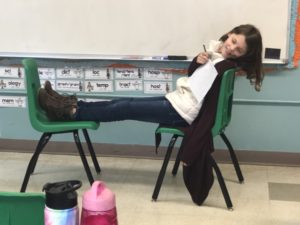 This week we read chapters 7 and 8, Toward a New Government and From Monarchy to Republic.
This week we read chapters 7 and 8, Toward a New Government and From Monarchy to Republic.
- Learned about The Declaration of the Rights of Man and The Women March to Versailles.
- Learned about A New Legislative Assembly, France at War and The Death of the King.
- The left-wingers (Radicals who wanted a republic and everything to change.) and the right-wingers (Conservatives who still wanted the king and everything to stay the same.)
(Written by: Tamra Wegner)
English Writing & Spelling
This week we learned the Greek and Latin roots phil, bio, and photo. In writing this week we continued working on argumentative writing.
- We finished our rough draft for argumentative writing
- Reviewed the definitions for the words in Greek and Latin roots
- Did our greek and latin roots packet
(Written by: Sophia )
by Ivary & Paola | Feb 8, 2019 | In The Loop
La Lectura
Our essential question this week was : What impact do we make in the environment we live in both individually and collectively? This week our class focused on the steps people can take to promote and create a healthier environment. We also be looked at how these changes impact the air, water, and other resources we need. Read read two informational pieces. Please ask your child to tell you about this.
Students took home some homework packets. They will be be expected to work on these in case we have school closures next week. Here are some activities that you can do with your child to help reinforce the skills we are practicing. This can be done in English too.
Word Workout
- Words to Know: synonyms and antonyms In this activity, your child chooses a word from the word list and gives you a one- or two-word clue to help you guess the word. Then you and your child think of a word that means the opposite of the word you guessed.
- Spelling: suffixes This list contains words with suffixes. Choose a word and say it without the suffix. Then, ask your child to say it with the suffix and spell it. Continue spelling all of the words from the list.
- Comprehension: main idea and key details: WIth your child read a newspaper/magazine article that discusses the topic we are currently seeing at school. Look for the main idea and supporting details. After deciding which sentence best states the main idea, review some of the details that support it.
Ciencias
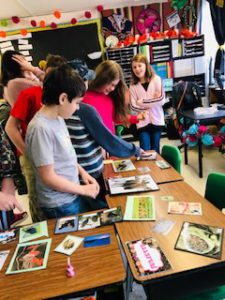
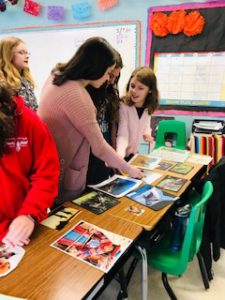
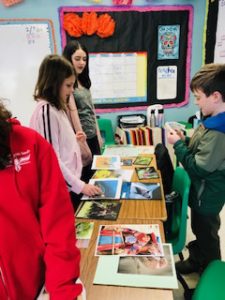
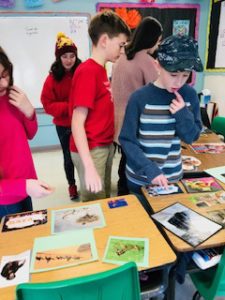
Mathematics
This week we began our new chapter, in our new textbooks! Our objectives were:
- to review prior knowledge that will be needed for this chapter
- to work on test corrections from the last chapter
Remember that Prodigy is a great way to keep those math skills sharp if we are to have a few snowy days.
History & Geography
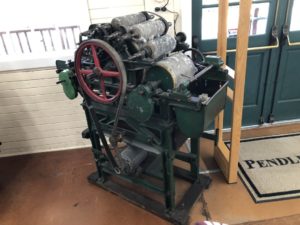
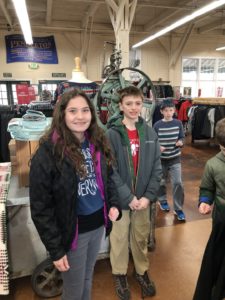
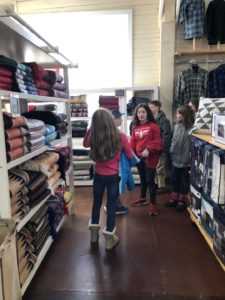 This week we continued learning about the French Revolution. Our objectives were:
This week we continued learning about the French Revolution. Our objectives were:
- Describe the storming of the Bastille on July 14.
- Understand the reaction in the French countryside to the fall of the Bastille.
English Writing & Spelling
This week we began studying the Greek and Latin roots phil,bio, and photo. Our unit is called love, life, and light.
We also began working on our rough drafts, Student can access these at any time from their google accounts.
by Ivary & Paola | Feb 1, 2019 | In The Loop
La Lectura
 !Celebrado la lectura! This week we celebrated our love for reading (and writing;) by sharing with the class our book reviews. Make sure you ask your child to show you the great pieces they, and their classmates, wrote produced. We have all added some great titles to our reading lists! This week we also continued learning about the life of one of the greatest Latin American writers, Gabriel Garcia Marquez. Since our genre studies focus was biographies, we read about his upbringing and experiences that inspired him to become one of the greatest of Spanish literature. Other objectives included:
!Celebrado la lectura! This week we celebrated our love for reading (and writing;) by sharing with the class our book reviews. Make sure you ask your child to show you the great pieces they, and their classmates, wrote produced. We have all added some great titles to our reading lists! This week we also continued learning about the life of one of the greatest Latin American writers, Gabriel Garcia Marquez. Since our genre studies focus was biographies, we read about his upbringing and experiences that inspired him to become one of the greatest of Spanish literature. Other objectives included:
• Pose and respond to specific questions with elaboration and detail by making comments that contribute to the topic, text, or issue under discussion.
• Cite textual evidence to support analysis of what the text says explicitly as well as inferences drawn from the text.
• Determine a theme or central idea of a text and how it is conveyed through particular details; provide a summary of the text distinct from personal opinions or judgments.
• Analyze in detail how a key individual, event, or idea is introduced, illustrated, and elaborated in a text (e.g., through examples or anecdotes).
• Apply a variety of comprehension and thinking skills while unpacking information from the text (this week’s focus: cause and effect situations)
• Review key characteristics of our genre studies for this week: Biographies.
• With some guidance and support from peers and adults, develop and strengthen writing as needed: final copy, publishing and sharing.
Ciencias
- Explain how adaptations help organisms survive in an environment.
- Describe how population can change over time in response to environmental factors.
Mathematics
This week we wrapped up our unit on algebraic expressions. Our objectives were:
•create and solve expressions from real world problems
•review for the chapter test by completing a classroom Brain Work question
•show what you know on the chapter test
History & Geography
This week we continued learning about the French Revolution. Our objectives were:
•Identify Marie Antoinette and describe her effect on the French people.
•Explain the meaning behind the legendary saying, “then let them eat cake.”
•Describe what happened at the 1789 meeting of the Estates-General.
•Understand Louis XVI’s role in the meeting.
•Understand how the National Assembly came into existence.
Reminder that our field trip to the Pendleton Mill is Thursday February 7th! We will be meeting there at 9 am.
English Writing & Spelling
This week we studied the Greek and Latin roots onym, host, hosp. All these roots have something to do with people!
We also worked on building a conclusion in our argumentative writing.
Specialists
Music with Ms. Erin
In January we learned the Italian terms for tempos from grave (very, very slow), to prestissimo (extremely fast). We practiced rhythm reading by clapping written rhythm patterns to these tempos. We learned about musical form, adding introduction, interlude, and coda to our knowledge base of verse, chorus (refrain), and bridge. We also started learning about Harlem Renaissance music.
In February we will be working on reading notation in the treble and bass clefs, and introducing the skill of sight singing. We will identify, write, read, sing, and play music from written notation using a variety of musical styles. We will learn about jazz, continuing our study of the Harlem Renaissance, by using lead sheets and singing popular jazz songs.
Art with Ms. Kelly
We worked on 2 projects in January:
Art Project: Cakes in the style of Wayne Thiebaud
Book and Website: Artwork by Wayne Thiebaud
Goals:
- Learn about the artist, Wayne Thiebaud (who is still painting at age 98!)
- Observe light and dark shapes, and shadows
- Draw a cylinder with a wedge cut out
- Use oil pastels to create shading and shadows
I’m sure you’ve enjoyed these beautiful cakes on the bulletin board at school!
Art Project: Figures in the style of Jacob Lawrence
Books: Jake Makes a World by Sharifa Rhodes-Pitt,
Story Painter: The Life of Jacob Lawrence
Goals:
- Learn about Jacob Lawrence, an African American artist
- (who grew up in Harlem but moved to Seattle and taught art at University of Washington)
- Use basic shapes to draw students at the blackboard
- Use tempera paint for the background and figures in your artwork
These awesome pictures are on the bulletin board at the end of the hallway!
by Ivary & Paola | Jan 25, 2019 | In The Loop
La Lectura
 This week in Literacy, we continued working on our objectives from last week. Students did a great job editing, revising and writing their final book review piece. We are very excited to share these published pieces with you all on our Spanish bulletin next week. Be on the lookout!
This week in Literacy, we continued working on our objectives from last week. Students did a great job editing, revising and writing their final book review piece. We are very excited to share these published pieces with you all on our Spanish bulletin next week. Be on the lookout!
We also had a chance to finish reading El relato de un naufrago, by Colombian writer Gabriel Garcia Marquez. It was very moving to have had the opportunity to share with my students the work of one of the most accomplished and renowned writers in contemporary Spanish literature. They learned about him, the influence of his work not only in Latin-America but all around the world, and maybe got inspired to read some other classic pieces of Spanish literature.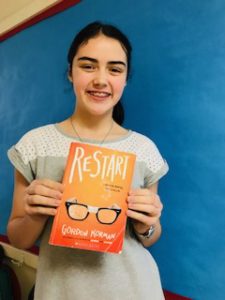
Ciencias
This week we continued to discuss the concept of adaptations. We started to view a video about population changes on the island of Hawaii. Students are identifying and reporting on the adaptations that affect the survival of organisms in this sensitive ecosystem.
Mathematics
This week we continued learning about Algebraic Expressions.
- We learned how to use the distributive property to expand algebraic expressions.
- Then, we learned different techniques to simplify algebraic expressions.
- Finally, we learned how to factor an algebraic expression.
(Written by: Juliette Murrow )
History & Geography
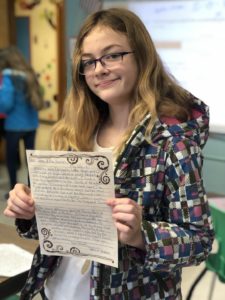 This week we continued learning about the French Revolution.
This week we continued learning about the French Revolution.
- We learned about what it is like to live in Versailles and how it was built.
- We wrote letters from a noble who lives in Versailles and about their daily life.
- We learned why people disliked Queen Marie Antoinette.
(Written by: Lily Hubbard)
English Writing & Spelling
This week we continued learning about Argumentative Writing. Our greek/latin roots this week were mob/mot, tract, and tend/tens/tent.
- We did a greek and latin roots packet with our greek and latin roots and learned that our roots all have something to do with movement.
- We learned about body paragraphs and the power of 3 and strengthening our argument.
- On tuesday we learned about writing an introduction and how it is the claim.
(Written by: Christian Alexander )
by Ivary & Paola | Jan 18, 2019 | In The Loop
La Lectura
The focus of literacy this week has been on a writing project – a book review. We have spent time analyzing the characteristics of a book review and have taken a close look at different samples written by other 6th grade students. Using a rubric, we have established the expectations for an accomplished piece. Every student has selected a book and has started the book review writing process working on their drafts.
• Analyze text, craft, and structure, citing text evidence.
• Use text evidence from close reading to write to a source.
• Pose and respond to specific questions with elaboration and detail by making comments that contribute to the topic, text, or issue under discussion.
• Cite textual evidence to support analysis of what the text says explicitly as well as inferences drawn from the text.
• Determine a theme or central idea of a text and how it is conveyed through particular details; provide a summary of the text distinct from personal opinions or judgments.
• Describe how a particular story’s or drama’s plot unfolds in a series of episodes as well as how the characters respond or change as the plot moves toward a resolution.
• With some guidance and support from peers and adults, develop and strengthen writing as needed by planning, revising, editing, rewriting, or trying a new approach.
Ciencias
This week students were introduced to the concept of adaptation. Tapping on their background knowledge and working in collaborative groups, students constructed arguments to explain this phenomenon, provided several examples and discussed their understanding. The class read an article on the topic and were able to confirm their definitions and expand their understanding, as well as answer comprehension questions. Next week, we will continue to explore more on this topic, watch some videos and take a closer look at different ecosystems to identify adaptations.
by Ivary & Paola | Jan 11, 2019 | In The Loop
La Lectura
It was so nice to see everybody, after a fun break, ready to start from day one! Our new unit for Literacy is Logros (Achievements). During this unit we will be discussing and reading different texts on topics such as: common interests, transformations, the meaning of development, advice, choices, role models. We can already tell it will be a fun unit!
At the beginning of the week we had a discussion about personal goals/objectives and the steps necessary to take in order to achieve them. We had an argumentative exchange about “new year resolutions”. It always great to hear our students insightful comments. We started the draft of our first writing assignment- a book review. Other objectives this week included:
• Identify areas of strength
• Analyze text, craft, and structure, citing text evidence.
• Use text evidence from close reading to write to a source.
• Understand the genre writing features to write a book review (pre-write).
• Debate and construct and arguments: Engage effectively in a range of collaborative discussions (one-on-one, in groups, and classmate-led) with diverse partners on grade 6 topics, texts, and issues, building on others’ ideas and expressing their own clearly.
• Review the key ideas expressed and demonstrate understanding of multiple perspectives through reflection and paraphrasing.
• With some guidance and support from peers and adults, develop and strengthen writing as needed by planning, revising, editing, rewriting, or trying a new approach.
Ciencias
How do you get your energy? What are some of the kinds of work that you do that require energy? Working in collaborative groups, students brainstormed ways organisms use energy to do work and make things happen. They sorted energy-use strips into categories: maintenance, growth/ reproduction, waste, and movement. They learned that all organism functions require energy.
Mathematics
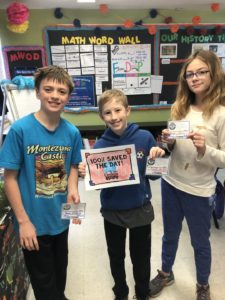
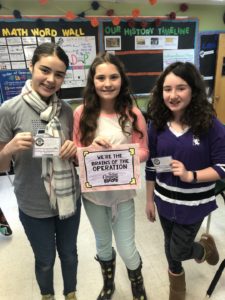
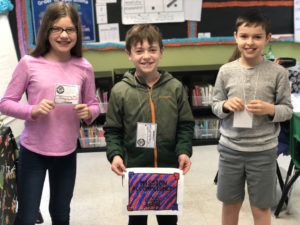 This week we began working with Algebraic Expressions. Our objectives were:
This week we began working with Algebraic Expressions. Our objectives were:
- review percents by completing an escape room
- use variables to write algebraic expressions
Reminder! Students will now be graded on completing 40min of Prodigy a week. They will be graded every Monday, unfortunately there is no way for the students to check their own minutes but they are welcome to ask me at any time.
History & Geography
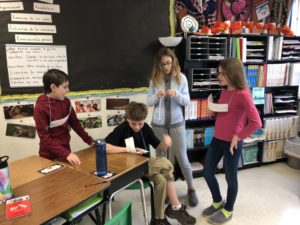
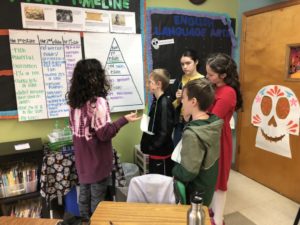 This week we began learning about the French
This week we began learning about the French 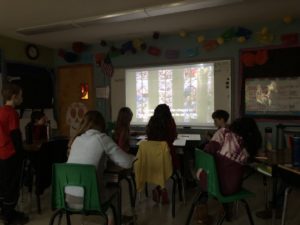 Revolution. Our objectives were:
Revolution. Our objectives were:
- describe the old regime in France
- identify the social classes, or Three Estates, of French society
- understand how the influence of Enlightenment ideas, of English rights, and of the Glorious Revolution affected revolutionary movements in America and France
- explain the French alliance during the American Revolution and its effect on both sides
English Writing & Spelling
This week we wrapped up our final Narrative writing pieces. Next week, we will begin writing Argumentative pieces.
Our Greek and Latin Roots this week were:
- dict/dic: say, declare
- graph/gram: write, draw, describe, record
- scrib/script: record
Specialists
Music with Ms. Erin
In December we learned Hanukkah and Christmas holiday songs for voice, guitar, ukulele, piano, and percussion. We learned new chords on guitar and ukulele. We practiced harmonies and sectional vocal layering skills.
In January we will be learning the Italian terms for a wide range of tempos, from grave (very, very slow), to prestissimo (extremely fast). We will also learn about musical form, adding introduction, interlude, and coda to our knowledge base of verse, chorus (refrain), and bridge.
Character Education with Ms. Jennie
This month in character ed we are focusing on the theme of Self-Control. We are talking about how to have self-control over our bodies, our words, and our emotions – pretty important all through life! We have two quotes: Self Control: Stop. Think. What could happen if you act that way? Is that what you want? –Anonymous and the famous verse on love: “Love is patient, love is kind, it does not envy, it does not boast, it is not proud. It is not rude, it is not self-seeking, it is not easily angered, it keeps no record of wrongs.” –St. Paul, 1 Corinthians 13:4-5. And for our poem we are reading The Red Wheelbarrow by William Carlos Williams – a sweet, short poem everyone can memorize.
The kids are finishing up their readers’ theatre scripts for Number the Stars and will perform them over the next couple weeks. Then we’ll be finishing up this novel and moving onto The War That Saved My Life next!
by Ivary & Paola | Dec 21, 2018 | In The Loop
La Lectura y Ciencias
This week students did their science presentations. Students were introduced to ten new ecosystems in the U.S. and Puerto Rico. Each student used a variety of resources, including the Internet and print materials, to research one of the ecosystems. The ecosystems all have an issue that poses a potential threat to the vitality of the system, such as acid rain, mineral extraction, habitat reduction, and so on. Students investigated and described the ecosystem, including food webs and abiotic factors. Each student prepared an individual report and participated in presentation of their findings. Once again, they outdid themselves!
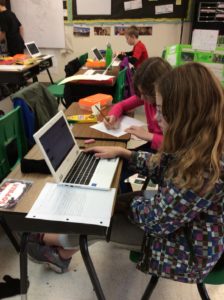
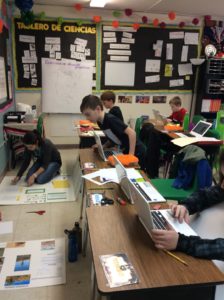
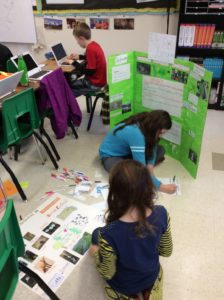
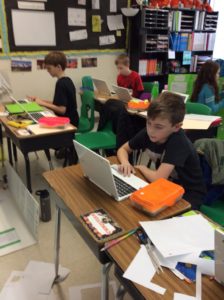
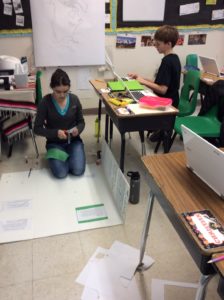
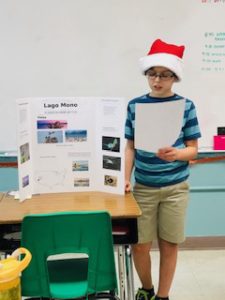
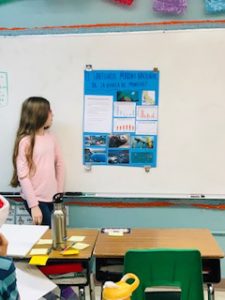
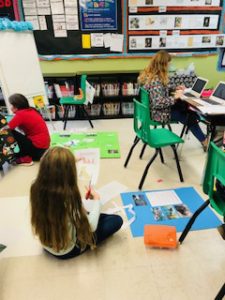
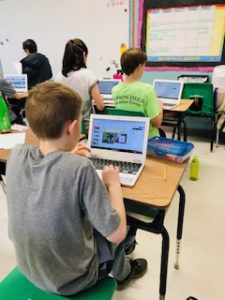
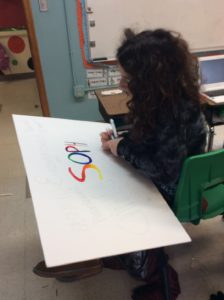
Mathematics
This week we wrapped up our chapter on Percents. Our objectives were:
- solve real-world problems
- review understanding percents, writing equivalent fractions,percents, and decimals, and performing calculations with percents
Over breaks students should practice their math skills on Prodigy. This is their only English homework to keep their math skills sharp!
History & Geography
This week we finished our unit on the Enlightenment. Our objectives were:
- explain how the ideas of the Enlightenment helped inspire American leaders to declare independence
- recognize specific Enlightenment ideas reflected in the Declaration of Independence and the U.S. Constitution
- Explain how the American patriots Thomas Jefferson, Benjamin Franklin, and James Madison each embodied the spirit of the Enlightenment
- Demonstrate understanding of the unit on the unit test
English Writing & Spelling
This week we focused on cycl, circum, and centr
Students completed their second Narrative writing piece this week. They will finish one more after break then we will move on to Argumentative writing!
by Ivary & Paola | Dec 14, 2018 | In The Loop
La Lectura Y Ciencias
Culminating a very successful trimester in the best possible way! Good job 5/6 grade class!
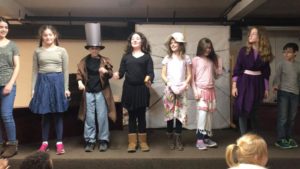
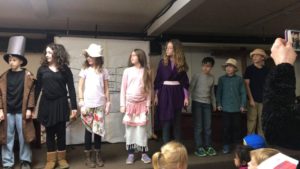
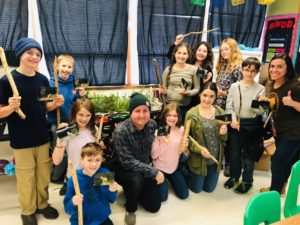
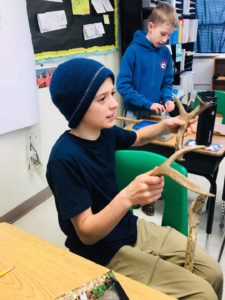
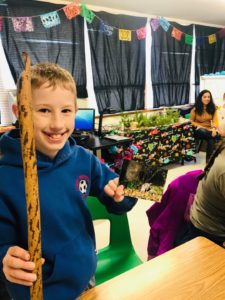
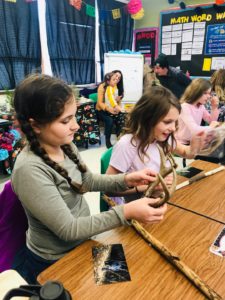
Mathematics
This week we began working with percents. Our objectives were:
- Understand percent notation
- Write equivalent fractions, decimals, and percents
- Find the percent of a number
History & Geography
This week we began learning about the Enlightenment. Our objectives were:
- Summarize John Locke’s philosophy about human knowledge and the responsibilities of
Government.
- Contrast Locke’s ideas with the ideas of Thomas Hobbes.
- Characterize the ideas of Montesquieu and Voltaire.
- Explain how the French ruling class tried to keep the message of the Enlightenment from reaching most French people.
English Writing & Spelling
Our objectives for writing were:
- To begin working individually on second narrative writing prompt
Greek and Latin:
- In this week’s greek and latin roots packet students focused on the roots sci, ology, and mem
by Ivary & Paola | Dec 7, 2018 | In The Loop
La Lectura
• Identify the elements of a variety of literary genres: tales, poems, plays. Compare.
• Recognize, identify and admire the characteristics of lyric poetry and sonnet.
• Identify literary elements of poetry: rhyme scheme, meter, theme, word selection, figurative speech (metaphors and similes), personification, tone, etc.
• Take notes, summarize, restate, and paraphrase the key ideas of the text.
• Integrate knowledge and ideas and make text-to-text connections.
• Express ideas applying vocabulary with precision and accuracy at an academic level.
• Vocabulary and word studies: building academic vocabulary, roots of words.
• Grammar: Clauses and appositives. Understand how clauses and appositives can determine or complement the noun in a sentence.
• Spelling : Words with r y rr
• Identify the elements of a play.
La Obra de Teatro de nuestra clase
La clase 5/6 va a presentar una obra de teatro en jueves, el 13 de Diciembre a 2:30 PM. Es sobre la vida de Abe Lincoln y todos son invitados a venir a la cafeteria para verlo. Eso es el producto de mas de un mes de trabajo.
The 5/6 class is going to present a play on thursday, the 13 of december at 2:30 PM. It is about the life of Abe Lincoln, and everyone is invited to join us in the cafeteria. What you will view is the end product of more than a month of work.
Ciencias
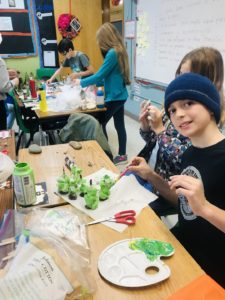
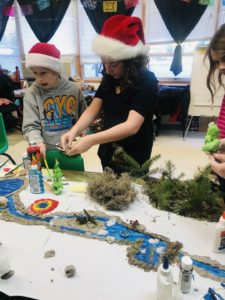
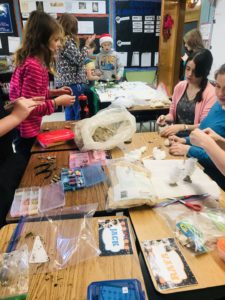
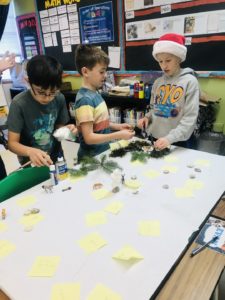
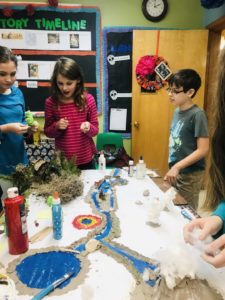
End of Science Module Project: Ecoscenarios
Students are introduced to ten new ecosystems in the U.S. and Puerto Rico. Each student will be given an ecosystem to study. They use a variety of resources, including the Internet and print materials, to work on their research of the ecosystems. The ecosystems all have an issue that poses a potential threat to the vitality of the system, such as acid rain, mineral extraction, habitat reduction, and so on. Students investigate and describe the ecosystem, including food webs and abiotic factors. Each student prepares an individual report and participates in a presentation of its findings. Students were given their topic of study on Friday. This project will be done in class next week, however, students are encouraged to do research and elaborate on this project at home so they are prepared for class work.
Mathematics
This week we wrapped up our chapter on Rates. Our objectives were:
- Solve rate problems including unit pricing and constant speed
- Solve problems involving rates and unit rates
- Demonstrate knowledge on the chapter test
History & Geography
 This week we began learning about the Enlightenment. Our objectives were:
This week we began learning about the Enlightenment. Our objectives were:
- Place the Enlightenment and its emphasis on science and human reason in historical context, and contrast the period with the Middle Ages and the Renaissance
- Explain how Newton’s scientific achievements influenced Enlightenment thinkers.
- Explain why Descartes is considered the father of modern philosophy.
- Explain Thomas Hobbes’s conclusions about human nature.
English Writing & Spelling
Our objectives for writing were:
- To begin working individually on second narrative writing prompt
Greek and Latin:
- Because students will be working on 2 more narrative writing pieces before winter break students will only be receiving their Greek and Latin roots packets these next few weeks
- In this weeks packet students focused on the roots vis, phon, and audi
Specialists
Character Education with Ms. Jennie
This month our theme is GENEROSITY. This past week we discussed different ways we can be generous out in the real world, such as buying a coffee for the person behind you in line, inviting a neighbor over for dinner, giving out snack bags to the homeless, or participating in a giving tree like we are doing at SWS. Our quote of the month is by Thomas Jefferson: “I believe that every human mind feels pleasure in doing good to another.” And we are reading a poem called Little Tree by e. e. cummings to celebrate the holiday season. We continue to read our chapter books in class too and do vocabulary, comprehension, and reader’s theatre.



 This week we started the unit Equations and Inequalities
This week we started the unit Equations and Inequalities

 This week we read chapters 7 and 8, Toward a New Government and From Monarchy to Republic.
This week we read chapters 7 and 8, Toward a New Government and From Monarchy to Republic. 




















 This week we began learning about the French
This week we began learning about the French 





















